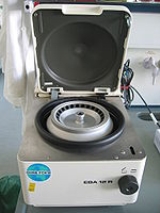
Laboratory centrifuge
Overview
Laboratory equipment
Laboratory equipment refers to the various tools and equipment used by scientists working in a laboratory. These include tools such as Bunsen burners, and microscopes as well as speciality equipment such as operant conditioning chambers, spectrophotometers and calorimeters...
, driven by a motor, which spins liquid samples at high speed.
There are various types of centrifuges, depending on the size and the sample capacity.
Like all other centrifuge
Centrifuge
A centrifuge is a piece of equipment, generally driven by an electric motor , that puts an object in rotation around a fixed axis, applying a force perpendicular to the axis...
s, laboratory centrifuges work by the sedimentation principle
Sedimentation
Sedimentation is the tendency for particles in suspension to settle out of the fluid in which they are entrained, and come to rest against a barrier. This is due to their motion through the fluid in response to the forces acting on them: these forces can be due to gravity, centrifugal acceleration...
, where the centripetal acceleration is used to separate substances of greater and lesser density.
There are various types of centrifugation:
- Differential centrifugationDifferential centrifugationDifferential centrifugation is a common procedure in microbiology and cytology used to separate certain organelles from whole cells for further analysis of specific parts of cells. In the process, a tissue sample is first homogenised to break the cell membranes and mix up the cell contents...
, often used to separate certain organelles from whole cells for further analysis of specific parts of cells - Isopycnic centrifugationIsopycnic centrifugationIsopycnic centrifugation, also known as density gradient centrifugation or equilibrium sedimentation is a technique used to separate molecules on the basis of buoyant density...
, often used to isolate nucleic acids such as DNADNADeoxyribonucleic acid is a nucleic acid that contains the genetic instructions used in the development and functioning of all known living organisms . The DNA segments that carry this genetic information are called genes, but other DNA sequences have structural purposes, or are involved in... - Sucrose gradient centrifugationSucrose gradient centrifugationSucrose gradient centrifugation is a type of centrifugation often used to purify enveloped viruses and ribosomes, and also to separate cell organelles from crude cellular extracts...
, often used to purify enveloped viruses and ribosomes, and also to separate cell organelles from crude cellular extracts
There are different types of laboratory centrifuges:
- Microcentrifuges
(devices for small tubes from 0.2 ml to 2.0 ml (micro tubes), up to 96 well-plates, compact design, small footprint; up to 30.000 g)
- Clinical centrifuges
(devices used for clinical applications like blood collection tubes, low-speed devices)
- Multipurpose benchtop centrifuges
(devices for a broad range of tube sizes, high variability, big footprint)
- Stand alone centrifuges
(heavy devices like the ultracentrifuge
Ultracentrifuge
The ultracentrifuge is a centrifuge optimized for spinning a rotor at very high speeds, capable of generating acceleration as high as 2,000,000 g . There are two kinds of ultracentrifuges, the preparative and the analytical ultracentrifuge...
)
Many centrifuges are available with (refrigerated device) or without cooling function.
There are different providers of laboratory centrifuges like
Eppendorf
Eppendorf (company)
Eppendorf is a provider of equipment for the field of biotechnology. The company develops, produces and distributes devices and systems for use in life science research laboratories worldwide....
, Thermo-Heraeus, Thermo-Sorvall, Hettich, Beckmann-Coulter, MSE
MSE (centrifuges)
MSE is an acronym for Measuring and Scientific Equipment Ltd. For other Acronyms of MSE, see MSE -History:MSE was founded in 1936, by Ernest Foulkes, initially as a manufacturer and distributor of machine tools and equipment...
, Sigma and Awel.
Centrifuge tubes or centrifuge tips are tapered tubes of various sizes made of glass
Glass
Glass is an amorphous solid material. Glasses are typically brittle and optically transparent.The most familiar type of glass, used for centuries in windows and drinking vessels, is soda-lime glass, composed of about 75% silica plus Na2O, CaO, and several minor additives...
or plastic
Plastic
A plastic material is any of a wide range of synthetic or semi-synthetic organic solids used in the manufacture of industrial products. Plastics are typically polymers of high molecular mass, and may contain other substances to improve performance and/or reduce production costs...
.
Discussions

